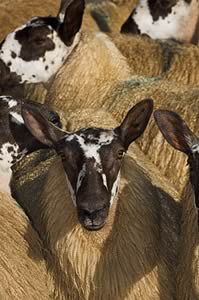 |
|||||||||
|
|||||||||||||||||||
|
|
Producers Urged to Protect Sheep from Dog Parasites EBLEX, the industry body for beef and lamb levy-payers in England, warns sheep producers to be vigilant against carcase condemnations due to parasite infections spread by dogs. In 2009, it was calculated over £7 million was lost to the English sheep industry due to Cysticercus ovis (C. ovis) and a further £500,000 due to 9% of livers being condemned with Cysticercus tenuicollis (C. tenuicollis).
C. Ovis, or Sheep Measles as it is often referred, is a disease identified by the presence of small cysts throughout the meat of the carcase. Infection cannot be detected until slaughter and generally diagnosis results in condemnation of the entire carcase. The disease stems from the canine adult tapeworm Taenia ovis and is transmitted to sheep when infected dogs shed eggs via their faeces onto pasture. Eggs can survive on pasture for up to six months. Within four to five weeks of sheep ingesting eggs they will start to develop infective cysts. If dogs eat raw meat or offal from an infected sheep, they will develop the T. ovis worm which continues the cycle. C.tenuicollis, or bladder worms, originate from the canine tapeworm Taenia hydatigena. The parasite has a similar lifecycle to C. ovis and the larvae develop and penetrate the sheep's intestine, spreading to various tissues including the omentum, mesentery, peritoneum and liver. Aside from liver condemnations, heavy infestation in lambs can cause haemorrhages and peritonitis. Moderate to heavy infections can cause loss of appetite of the sheep, leading to longer finishing periods, increased feed costs and the risk of loss in value due to not reaching target specification. Sheep may also become weak, leaving them prone to other infections. Once a sheep is exposed to the tapeworm eggs, it is impossible to prevent the cysts developing, therefore preventing the sheep being exposed to the tapeworm is essential. Producers are advised to:
|
||||||||||||||||||

|
|
||||||||||||||||||
| home | agri-services | pedigree
pen | news | dairy | beef | machinery property | organisations | site map |
|||||||||||||||||||

